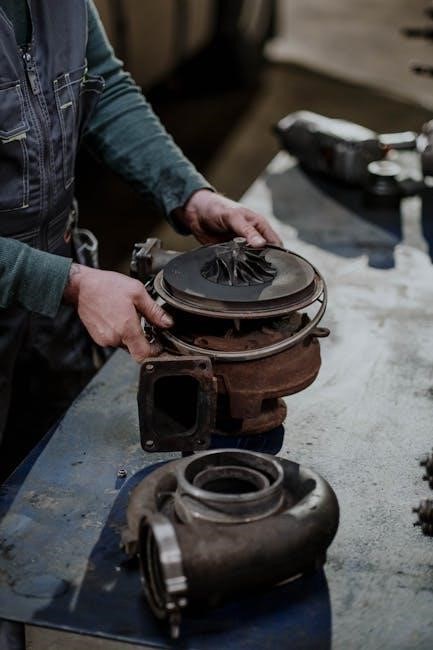This guide provides essential information on maintaining your Nissan vehicle‚ ensuring optimal performance‚ safety‚ and longevity․ Regular maintenance‚ including oil changes and tire rotations‚ helps prevent issues and extends your car’s lifespan․ By following the recommended schedule‚ you can keep your Nissan running smoothly for years to come․
Why Regular Maintenance is Important
Regular maintenance ensures your Nissan performs optimally‚ prevents mechanical failures‚ and enhances safety․ It improves fuel efficiency‚ reduces repair costs‚ and prolongs vehicle lifespan․ Routine checks help identify issues early‚ avoiding costly damages․ Proper maintenance also maintains warranty coverage and preserves resale value․ Staying on schedule ensures reliability and peace of mind‚ keeping your Nissan running smoothly for years․ Consistent care is crucial for sustaining performance and avoiding unexpected breakdowns‚ ensuring your vehicle remains in peak condition․
Overview of Nissan Maintenance Schedule
Nissan’s maintenance schedule is designed to ensure your vehicle runs efficiently and reliably․ It outlines recommended service intervals at 15‚000‚ 30‚000‚ 60‚000‚ and 90‚000 miles․ These intervals include essential checks like oil changes‚ tire rotations‚ and fluid replacements․ The schedule may vary depending on driving conditions and specific models‚ such as the Altima‚ Sentra‚ Rogue‚ or Pathfinder․ Sticking to this plan helps prevent issues‚ reduces repair costs‚ and maintains your vehicle’s performance․ Regular maintenance also supports warranty coverage and enhances overall longevity․

Nissan Maintenance Schedule Overview
The Nissan maintenance schedule outlines essential service intervals at 15‚000‚ 30‚000‚ 60‚000‚ and 90‚000 miles․ Regular checks ensure optimal performance‚ safety‚ and vehicle longevity․ Follow the guide for a tailored plan;
Recommended Service Intervals
Nissan recommends specific intervals for maintenance to ensure your vehicle runs efficiently․ The initial major service is at 15‚000 miles‚ followed by 30‚000‚ 60‚000‚ and 90‚000 miles․ These intervals include oil changes‚ tire rotations‚ and inspections of key components like brakes and belts․ Adhering to this schedule helps prevent breakdowns‚ reduces repair costs‚ and maintains your car’s performance and reliability over time․ Always consult your owner’s manual for model-specific details․
15‚000 Miles Service
The 15‚000-mile service is the first major maintenance checkpoint for your Nissan․ It typically includes an oil and filter change‚ tire rotation‚ and a comprehensive inspection of brakes‚ belts‚ and fluids․ This service ensures your vehicle remains in optimal condition‚ addressing potential issues before they escalate․ Regular 15‚000-mile services are crucial for maintaining performance‚ fuel efficiency‚ and overall reliability․ Always refer to your owner’s manual for specific details tailored to your Nissan model․
30‚000 Miles Service
The 30‚000-mile service is a more detailed maintenance checkpoint for your Nissan․ It includes an oil and filter change‚ tire rotation‚ and a thorough inspection of key components like the air filter‚ battery‚ belts‚ and hoses․ Additionally‚ transmission fluid may be replaced‚ and the brake system is checked for wear․ This service helps identify and address potential issues early‚ ensuring your vehicle continues to perform efficiently and reliably․ Regular adherence to this schedule is vital for maintaining your Nissan’s health and longevity․
60‚000 Miles Service
The 60‚000-mile service is a significant maintenance milestone for your Nissan․ It includes replacing the timing belt‚ spark plugs‚ and coolant; The battery is tested‚ and the air filter is replaced if necessary․ Brake pads and rotors are inspected‚ and the exhaust system is checked for leaks․ This comprehensive service ensures your vehicle’s critical systems are in top condition‚ preventing costly repairs and maintaining optimal performance․ Regular completion of this service is crucial for extending your car’s lifespan and reliability․
90‚000 Miles Service
The 90‚000-mile service is a critical checkpoint for your Nissan’s long-term health․ It typically involves replacing the timing belt‚ coolant‚ and transmission fluid․ Spark plugs are also replaced to ensure proper engine performance․ Additionally‚ the drive belts and hoses are inspected for wear‚ and the brake pads and rotors are checked for deterioration․ This service is designed to address wear and tear‚ prevent potential breakdowns‚ and maintain your vehicle’s reliability and efficiency over time․

Oil Change and Filter Replacement
Regular oil changes and filter replacements are vital for maintaining your Nissan’s engine health․ Follow the recommended schedule to ensure optimal performance and longevity of your vehicle․
Frequency of Oil Changes
Nissan recommends oil changes every 5‚000 miles or six months‚ whichever comes first‚ to ensure optimal engine performance and longevity․ Regular oil changes prevent engine wear‚ maintain fuel efficiency‚ and keep your vehicle running smoothly․ Always consult your owner’s manual for model-specific recommendations‚ as intervals may vary based on driving conditions and vehicle type; Sticking to this schedule helps prevent costly repairs and ensures your Nissan remains in excellent condition over time․
Choosing the Right Oil for Your Nissan
Selecting the correct oil for your Nissan is crucial for optimal engine performance and longevity․ Always refer to your owner’s manual for the recommended oil type‚ as specifications vary by model․ Nissan typically recommends synthetic or conventional oil‚ depending on the vehicle and driving conditions․ Ensure the oil meets API SN standards and the viscosity grade specified for your model․ Using the wrong oil can lead to reduced fuel efficiency‚ engine damage‚ or void your warranty․ Choose wisely to protect your investment and maintain peak performance;
Oil Filter Replacement Guidelines
Regular oil filter replacement is essential for maintaining your Nissan’s engine health․ It is recommended to replace the oil filter every 5‚000 to 7‚500 miles‚ depending on your model and driving conditions․ Always use a Nissan-approved oil filter to ensure compatibility and optimal performance․ Refer to your owner’s manual for specific guidelines tailored to your vehicle․ Proper disposal of the old filter is also important to protect the environment․ Following these guidelines helps maintain your engine’s efficiency and longevity․

Tire Maintenance
Proper tire maintenance ensures optimal performance‚ safety‚ and longevity․ Regular rotations‚ pressure checks‚ and alignment help prevent uneven wear and improve handling‚ ensuring a smooth and safe ride․
Tire Rotation Patterns
Tire rotation is crucial for ensuring even tread wear and extending tire life․ Nissan recommends rotating tires every 5‚000 to 8‚000 miles‚ following specific patterns․ For most models‚ a rearward cross or forward cross pattern is suggested‚ depending on whether the vehicle is front-wheel or all-wheel drive․ Proper rotation ensures balanced handling‚ improves safety‚ and prevents uneven wear․ Always refer to your owner’s manual for the exact pattern and interval tailored to your vehicle․ Regular rotations are key to maintaining optimal tire performance and longevity․
Tire Pressure Check and Adjustment
Regular tire pressure checks are vital for safety‚ fuel efficiency‚ and tire longevity․ Check pressure monthly and before long trips using a reliable gauge․ Refer to your owner’s manual for the recommended PSI‚ as specs vary by model and load․ Under-inflated tires can lead to uneven wear and reduced performance‚ while over-inflated tires may compromise traction․ Adjust pressure as needed to ensure optimal driving conditions and extend tire life․ Proper inflation also improves handling and reduces the risk of tire damage․
Wheel Alignment and Balance
Proper wheel alignment and balance are crucial for optimal vehicle performance․ Misaligned wheels can cause uneven tire wear and poor handling‚ while unbalanced wheels lead to vibrations․ Regular checks ensure even weight distribution and smooth driving․ Schedule alignment and balancing during routine maintenance or if you notice vibrations or pulling to one side․ This maintains traction‚ reduces wear‚ and enhances safety․ Correct alignment also improves fuel efficiency and extends tire life‚ ensuring your Nissan drives as intended for years to come․

Fluid Checks and Replacements
Regular fluid checks are vital for your Nissan’s health․ Engine coolant‚ transmission‚ and brake fluids must be inspected and replaced as per the schedule to ensure proper functionality and prevent damage․
Engine Coolant Check
Regular engine coolant checks are crucial to prevent overheating and damage to your Nissan’s engine․ Typically‚ coolant should be inspected every 30‚000 to 60‚000 miles․ During the check‚ technicians look for leaks‚ contamination‚ and proper coolant levels․ Ensuring the coolant is free from debris and corrosion helps maintain optimal engine performance․ Always use the recommended coolant type for your Nissan model‚ as specified in the owner’s manual‚ to avoid compatibility issues and ensure longevity․
Transmission Fluid Check
Regular transmission fluid checks are essential for smooth gear operation and preventing costly repairs․ Nissan recommends inspecting the fluid every 30‚000 to 60‚000 miles‚ depending on driving conditions․ During the check‚ technicians look for signs of contamination‚ discoloration‚ or low levels․ Clean fluid ensures optimal transmission performance and prevents overheating․ Always use the type of fluid specified in your owner’s manual to maintain compatibility and avoid damage to the transmission system․
Brake Fluid Replacement
Brake fluid replacement is crucial for maintaining effective braking performance․ Nissan recommends replacing the brake fluid every 30‚000 to 60‚000 miles or as indicated by your vehicle’s condition․ Contaminated or degraded fluid can lead to spongy brake pedals and reduced stopping power․ During replacement‚ use the specified DOT-rated brake fluid to ensure compatibility with your Nissan’s braking system․ Proper maintenance ensures your safety on the road and prevents costly repairs down the line․

Essential Checks and Replacements
This section outlines critical checks and replacements needed to keep your Nissan running efficiently․ Regular inspections of air filters‚ spark plugs‚ and timing belts are vital for optimal performance and longevity․
Air Filter Replacement
Air filter replacement is crucial for maintaining your Nissan’s performance and fuel efficiency․ It is recommended to replace the air filter every 15‚000 to 30‚000 miles‚ depending on driving conditions․ If you frequently drive in dusty or polluted areas‚ consider replacing it sooner․ A dirty air filter can reduce engine efficiency and increase emissions; Always use a genuine Nissan air filter for optimal results․ Regular checks and replacements ensure your engine runs smoothly and maintains its power and efficiency over time․ Proper maintenance enhances overall vehicle performance and longevity․
Spark Plug Replacement
Spark plug replacement is essential for maintaining your Nissan’s engine performance and efficiency․ Typically‚ spark plugs should be replaced every 30‚000 to 100‚000 miles‚ depending on the model and driving conditions․ Worn-out spark plugs can cause misfires‚ poor fuel efficiency‚ and reduced power․ Always use genuine Nissan spark plugs for optimal performance․ Regular replacements by certified technicians ensure proper installation and prevent potential engine damage․ Timely replacements help maintain smooth engine operation and overall vehicle reliability․ Spark plug maintenance is crucial for long-term engine health and performance consistency․
Timing Belt Replacement
The timing belt is a critical component that synchronizes engine operations․ Typically‚ it should be replaced between 60‚000 to 105‚000 miles‚ depending on your Nissan model․ Failing to replace a worn or cracked timing belt can lead to costly engine damage․ Always use genuine Nissan parts and have the replacement done by a certified technician to ensure proper installation․ Regular inspections and timely replacements help prevent breakdowns and maintain engine performance․ A well-maintained timing belt is essential for the longevity and reliability of your vehicle․

Model-Specific Maintenance
Model-specific maintenance ensures optimal performance for your Nissan․ Schedules vary by model‚ such as Altima‚ Sentra‚ Rogue‚ and Pathfinder‚ depending on mileage and driving conditions․ Always consult your owner’s manual or certified service center for precise recommendations tailored to your vehicle․
Nissan Altima Maintenance Schedule
The Nissan Altima maintenance schedule recommends services at 15‚000‚ 30‚000‚ 60‚000‚ and 90‚000 miles․ Oil changes are needed every 5‚000 miles or six months‚ with tire rotations every 7‚500 miles․ Brake fluid replacement is typically required every 30‚000 miles or as indicated by the owner’s manual․ Spark plug replacement is suggested at 105‚000 miles․ Regular inspections of belts‚ hoses‚ and fluids ensure longevity; Always consult the owner’s manual or a certified service center for model-specific needs․
Nissan Sentra Maintenance Schedule
The Nissan Sentra maintenance schedule includes key services at 15‚000‚ 30‚000‚ 60‚000‚ and 90‚000 miles․ Oil changes are recommended every 5‚000 miles or six months‚ with tire rotations every 7‚500 miles․ Brake fluid replacement is typically needed every 30‚000 miles‚ and spark plugs should be replaced around 105‚000 miles․ Regular checks of belts‚ hoses‚ and fluids are essential to maintain performance․ Always refer to the owner’s manual or consult a certified Nissan service center for model-specific recommendations and ensure your Sentra runs smoothly for years․
Nissan Rogue Maintenance Schedule
The Nissan Rogue maintenance schedule recommends services at 15‚000‚ 30‚000‚ 60‚000‚ and 90‚000 miles․ Oil changes are advised every 5‚000 miles or six months․ Tire rotations should occur every 7‚500 miles to ensure even wear․ Brake fluid replacement is typically needed at 30‚000 miles‚ while spark plugs are usually replaced around 105‚000 miles․ Regular checks of belts‚ hoses‚ and fluids are crucial․ For model-specific details‚ consult the owner’s manual or visit a certified Nissan service center to keep your Rogue in top condition․
Nissan Pathfinder Maintenance Schedule
The Nissan Pathfinder maintenance schedule includes key services at 15‚000‚ 30‚000‚ 60‚000‚ and 90‚000 miles․ Oil changes are required every 5‚000 miles or six months․ Tire rotations should occur every 7‚500 miles for even wear․ Brake fluid replacement is typically recommended at 30‚000 miles‚ while spark plugs are usually replaced around 105‚000 miles․ Coolant checks and transmission fluid inspections are also important․ For specific details‚ consult your owner’s manual or visit a certified Nissan service center to ensure your Pathfinder remains reliable and performs at its best․
Diagnostic Tools and Technology
Nissan offers advanced diagnostic tools like NissanConnect Services and the MyNISSAN app‚ enabling owners to monitor vehicle health‚ schedule services‚ and access maintenance information conveniently․
Using the Owner’s Manual
Your owner’s manual is a crucial resource for understanding your Nissan’s maintenance needs․ It outlines recommended service intervals‚ oil change frequencies‚ and specific guidelines for tire rotations‚ fluid checks‚ and more․ The manual also provides detailed instructions for monitoring your vehicle’s health and scheduling appointments․ By referencing it regularly‚ you can ensure your Nissan receives the care it needs to perform optimally and avoid potential issues down the road․ Always consult your manual for personalized maintenance recommendations tailored to your vehicle․
NissanConnect Services and MyNISSAN App
NissanConnect Services and the MyNISSAN App provide convenient tools to manage your vehicle’s maintenance․ These platforms allow you to schedule service appointments‚ track maintenance history‚ and receive reminders for upcoming tasks․ You can also monitor your vehicle’s health‚ access diagnostic information‚ and control certain functions remotely․ Additionally‚ the app offers personalized maintenance recommendations and alerts for recalls or updates․ Using these digital tools ensures you stay connected to your Nissan’s needs‚ making maintenance easier and more efficient than ever before․

Maintenance Costs and Savings
Nissan maintenance costs vary by model and mileage‚ but average around $400-$700 annually․ Service coupons‚ discounts‚ and plans help reduce expenses‚ ensuring cost-effective vehicle care․
Average Cost of Nissan Maintenance
The average cost of Nissan maintenance varies between $400 to $700 annually‚ depending on the model and mileage․ Routine services like oil changes and tire rotations are relatively affordable‚ while higher-mileage services‚ such as 60‚000 or 90‚000-mile checks‚ can be more costly․ Costs may also differ based on location and dealership rates․ Certified service centers often provide competitive pricing and savings opportunities through coupons or maintenance plans‚ helping owners reduce expenses while ensuring quality care for their vehicles․
Service Coupons and Discounts
Nissan service centers frequently offer coupons and discounts to help reduce maintenance costs․ These may include discounts on oil changes‚ tire rotations‚ and multi-service packages․ Many dealerships provide monthly promotions or loyalty programs for repeat customers․ Additionally‚ some service centers offer special deals for first-time visitors or referrals․ Checking the dealership’s website or contacting them directly can help you find current offers tailored to your needs‚ ensuring cost-effective maintenance for your Nissan vehicle․

Certified Service Centers
Certified Nissan service centers provide expert care‚ genuine parts‚ and warranty protection․ Trained technicians ensure quality repairs and maintenance‚ keeping your vehicle in optimal condition․ Visit one today for trusted service․
Benefits of Certified Nissan Service Centers
Certified Nissan service centers offer numerous advantages‚ including expert technicians trained to handle specific models‚ genuine Nissan parts‚ and warranty protection․ They provide accurate diagnostics‚ ensuring repairs are done right the first time․ Additionally‚ these centers often have convenient hours‚ online scheduling‚ and service coupons to help you save․ The use of advanced tools and technology ensures your vehicle receives the highest level of care‚ maintaining its performance and longevity․ Visit a certified center for reliable and efficient service․
How to Find a Certified Nissan Service Center
To locate a certified Nissan service center‚ visit the official Nissan website and use their dealer locator tool․ Enter your ZIP code or city to find nearby centers․ You can also use the MyNISSAN app‚ which provides a convenient way to search and schedule services․ Additionally‚ contact Nissan customer service for assistance․ Ensure the center displays the Nissan certification and offers genuine parts and warranty-backed repairs for a trusted experience․ This ensures your vehicle receives top-tier care‚ maintaining its performance and value․
Warranty and Maintenance Plans
Nissan offers comprehensive warranty programs‚ including basic and extended plans‚ to cover repairs and replacements for parts and labor․ These plans vary in duration and coverage‚ ensuring protection for your vehicle’s critical systems․ Additionally‚ maintenance plans like Nissan Maintenance Care provide scheduled services‚ including oil changes and tire rotations‚ for a set period or mileage‚ enhancing your ownership experience with convenience and cost savings․
Nissan Warranty Coverage
Nissan’s warranty coverage provides extensive protection for new vehicles‚ typically including a 3-year/36‚000-mile basic warranty and a 5-year/60‚000-mile powertrain warranty․ This coverage ensures that repairs and replacements for parts and labor are handled at no additional cost to the owner‚ offering peace of mind․ The warranty applies to defects in materials and workmanship under normal use‚ excluding wear-and-tear items like tires and brakes; Extended warranties are also available for added protection beyond the standard coverage period‚ giving owners flexibility and enhanced security for their vehicle investment․
Nissan Service Protection Plan
The Nissan Service Protection Plan offers flexible coverage tiers—Red‚ Gold‚ and Platinum—providing varying lengths of protection from 1 to 3 years․ This plan covers essential maintenance services like oil changes and tire rotations‚ helping to manage costs․ It’s designed to complement the factory warranty‚ offering extended support for parts and labor․ With this plan‚ owners can enjoy peace of mind knowing their vehicle is protected beyond the standard warranty period‚ ensuring continued reliability and performance without unexpected expenses․

Driving Conditions and Adjustments
Severe driving conditions‚ such as extreme temperatures or frequent stop-and-go traffic‚ may require more frequent maintenance․ Adjustments to your Nissan’s schedule ensure optimal performance and longevity under varying conditions․
Adjusting Maintenance for Severe Driving Conditions
Severe driving conditions‚ such as frequent stop-and-go traffic‚ extreme temperatures‚ or towing‚ require more frequent maintenance․ For instance‚ oil changes may be needed every 5‚000 miles instead of the standard 7‚500․ Additionally‚ brake fluid and transmission fluid should be checked more often to ensure optimal performance․ Tire rotations should also be performed more frequently to maintain even wear․ Always consult your owner’s manual or a certified Nissan service center for specific adjustments based on your driving habits and environment․
Impact of Driving Habits on Maintenance Needs
Driving habits significantly influence maintenance needs․ Aggressive driving‚ frequent stop-and-go traffic‚ or extreme temperatures can accelerate wear on components like brakes and tires․ Regular long-distance trips or towing may also require more frequent fluid checks and filter replacements․ Additionally‚ excessive idling or rapid acceleration can affect engine performance․ Monitoring these habits helps tailor maintenance schedules to individual driving styles‚ ensuring optimal vehicle health and preventing premature wear․ Always refer to your owner’s manual for personalized recommendations․
Following the Nissan Service Maintenance Guide ensures your vehicle’s longevity‚ optimal performance‚ and safety․ Regular maintenance is key to preserving your investment and enjoying a trouble-free driving experience․
Importance of Sticking to the Maintenance Schedule
Adhering to the Nissan maintenance schedule ensures your vehicle runs efficiently‚ prevents mechanical failures‚ and optimizes fuel efficiency․ Regular checks and replacements‚ like oil changes and tire rotations‚ help identify potential issues early‚ saving you from costly repairs․ By following the recommended intervals‚ you can maintain your car’s performance‚ extend its lifespan‚ and ensure safety on the road․ Consistency in maintenance also helps preserve your vehicle’s value and reduces long-term ownership costs․
Final Tips for Long Vehicle Lifespan
For a long-lasting vehicle‚ avoid aggressive driving‚ as it accelerates wear․ Regularly wash and wax your car to protect against rust and damage․ Address minor issues promptly to prevent costly repairs․ Use genuine Nissan parts for optimal performance and longevity․ Keep maintenance records organized for easy tracking․ Avoid overloading your vehicle‚ as it strains the engine and suspension․ By combining these practices with scheduled maintenance‚ you’ll ensure your Nissan remains reliable‚ efficient‚ and in excellent condition for years to come․



